Theories to Explain Health Social Determinants: A Comparative Analysis
VerifiedAdded on 2023/06/10
|9
|2530
|157
Essay
AI Summary
This essay delves into the complex realm of health social determinants, exploring how societal and financial conditions impact individual and group health outcomes. The essay examines two key sociological perspectives: the Functionalist Theory, which views society as a system of interconnected parts working in equilibrium, and the Conflict Perspective, which emphasizes social inequalities and power dynamics. The Functionalist perspective is discussed in relation to the concept of the "sick role," outlining the rights and obligations of those who are ill. The Conflict Perspective highlights how social disadvantages lead to health disparities. The essay contrasts these sociological perspectives with the biomedical model, which focuses on individual biological processes, and argues that while the biomedical model is crucial, it is insufficient for addressing the social determinants of health. The analysis includes discussions of eating disorders as an example of the conflict perspective and concludes by emphasizing the importance of understanding social factors in addressing health inequalities.
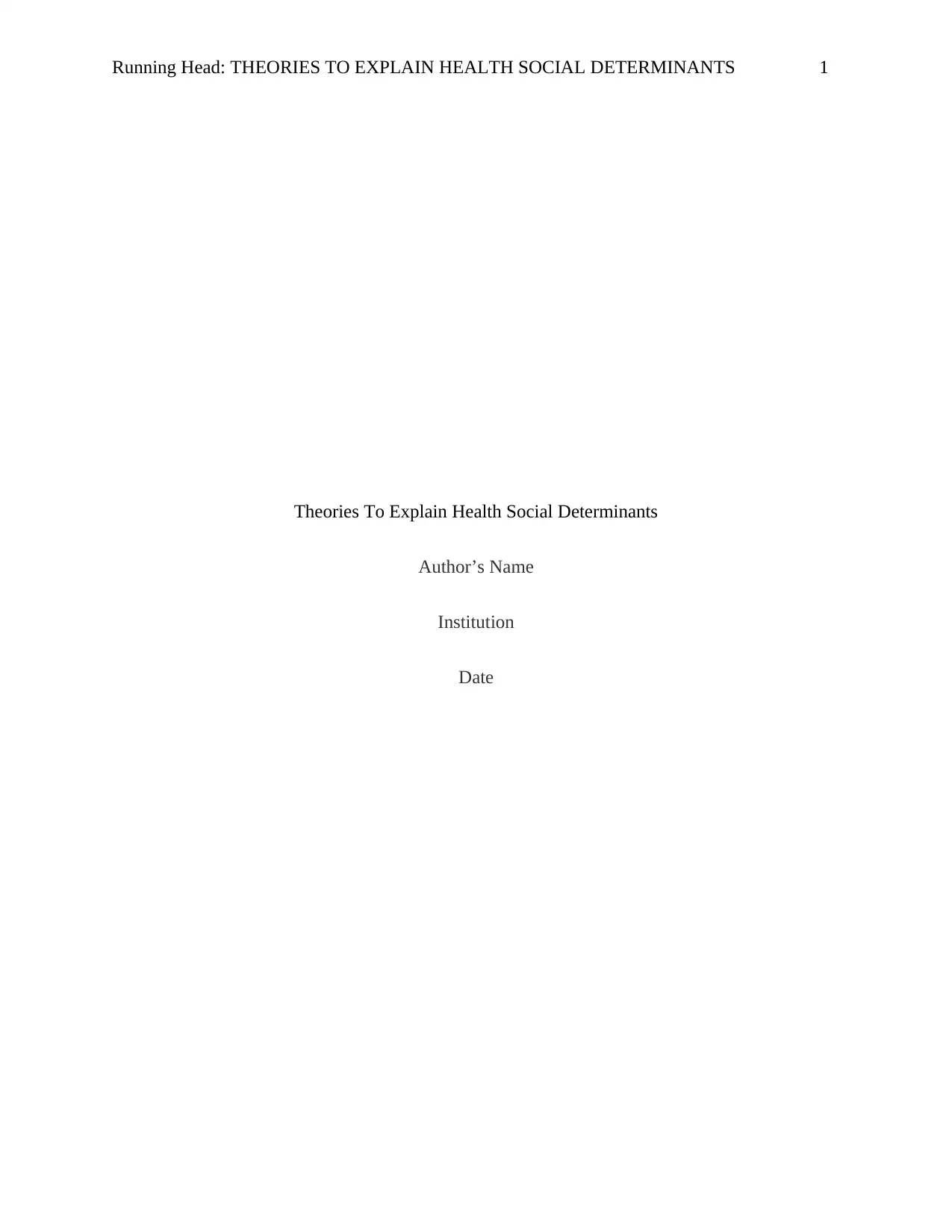
Running Head: THEORIES TO EXPLAIN HEALTH SOCIAL DETERMINANTS 1
Theories To Explain Health Social Determinants
Author’s Name
Institution
Date
Theories To Explain Health Social Determinants
Author’s Name
Institution
Date
Paraphrase This Document
Need a fresh take? Get an instant paraphrase of this document with our AI Paraphraser
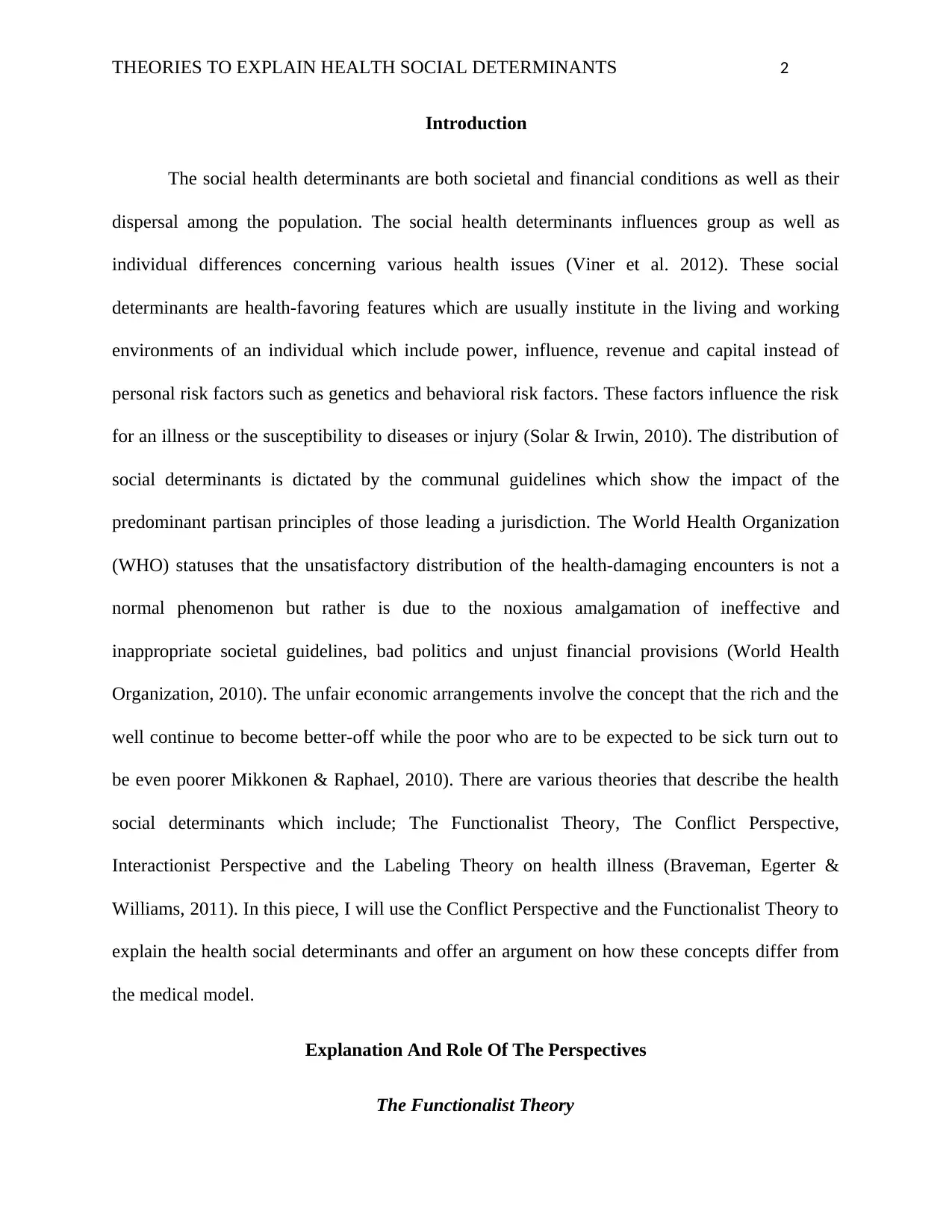
THEORIES TO EXPLAIN HEALTH SOCIAL DETERMINANTS 2
Introduction
The social health determinants are both societal and financial conditions as well as their
dispersal among the population. The social health determinants influences group as well as
individual differences concerning various health issues (Viner et al. 2012). These social
determinants are health-favoring features which are usually institute in the living and working
environments of an individual which include power, influence, revenue and capital instead of
personal risk factors such as genetics and behavioral risk factors. These factors influence the risk
for an illness or the susceptibility to diseases or injury (Solar & Irwin, 2010). The distribution of
social determinants is dictated by the communal guidelines which show the impact of the
predominant partisan principles of those leading a jurisdiction. The World Health Organization
(WHO) statuses that the unsatisfactory distribution of the health-damaging encounters is not a
normal phenomenon but rather is due to the noxious amalgamation of ineffective and
inappropriate societal guidelines, bad politics and unjust financial provisions (World Health
Organization, 2010). The unfair economic arrangements involve the concept that the rich and the
well continue to become better-off while the poor who are to be expected to be sick turn out to
be even poorer Mikkonen & Raphael, 2010). There are various theories that describe the health
social determinants which include; The Functionalist Theory, The Conflict Perspective,
Interactionist Perspective and the Labeling Theory on health illness (Braveman, Egerter &
Williams, 2011). In this piece, I will use the Conflict Perspective and the Functionalist Theory to
explain the health social determinants and offer an argument on how these concepts differ from
the medical model.
Explanation And Role Of The Perspectives
The Functionalist Theory
Introduction
The social health determinants are both societal and financial conditions as well as their
dispersal among the population. The social health determinants influences group as well as
individual differences concerning various health issues (Viner et al. 2012). These social
determinants are health-favoring features which are usually institute in the living and working
environments of an individual which include power, influence, revenue and capital instead of
personal risk factors such as genetics and behavioral risk factors. These factors influence the risk
for an illness or the susceptibility to diseases or injury (Solar & Irwin, 2010). The distribution of
social determinants is dictated by the communal guidelines which show the impact of the
predominant partisan principles of those leading a jurisdiction. The World Health Organization
(WHO) statuses that the unsatisfactory distribution of the health-damaging encounters is not a
normal phenomenon but rather is due to the noxious amalgamation of ineffective and
inappropriate societal guidelines, bad politics and unjust financial provisions (World Health
Organization, 2010). The unfair economic arrangements involve the concept that the rich and the
well continue to become better-off while the poor who are to be expected to be sick turn out to
be even poorer Mikkonen & Raphael, 2010). There are various theories that describe the health
social determinants which include; The Functionalist Theory, The Conflict Perspective,
Interactionist Perspective and the Labeling Theory on health illness (Braveman, Egerter &
Williams, 2011). In this piece, I will use the Conflict Perspective and the Functionalist Theory to
explain the health social determinants and offer an argument on how these concepts differ from
the medical model.
Explanation And Role Of The Perspectives
The Functionalist Theory
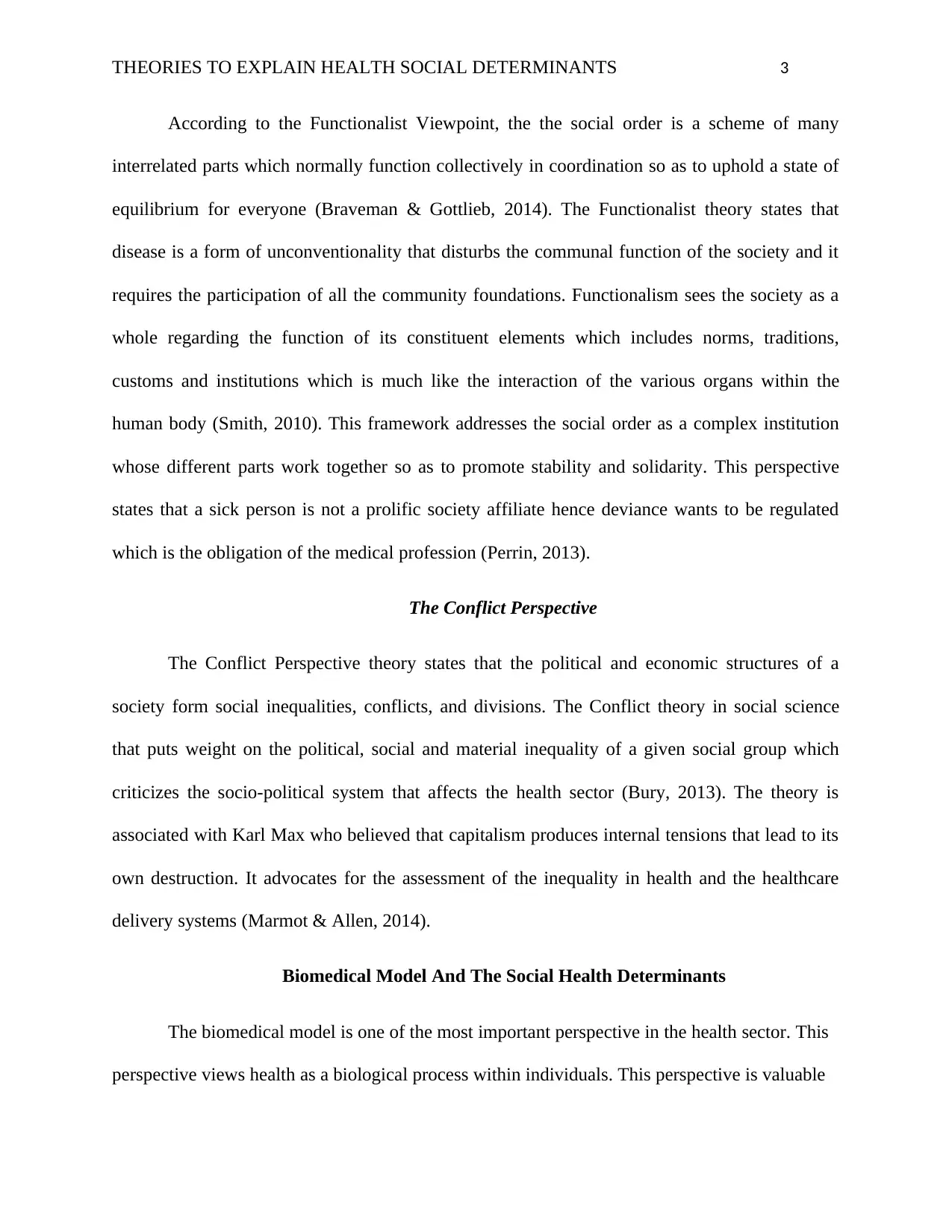
THEORIES TO EXPLAIN HEALTH SOCIAL DETERMINANTS 3
According to the Functionalist Viewpoint, the the social order is a scheme of many
interrelated parts which normally function collectively in coordination so as to uphold a state of
equilibrium for everyone (Braveman & Gottlieb, 2014). The Functionalist theory states that
disease is a form of unconventionality that disturbs the communal function of the society and it
requires the participation of all the community foundations. Functionalism sees the society as a
whole regarding the function of its constituent elements which includes norms, traditions,
customs and institutions which is much like the interaction of the various organs within the
human body (Smith, 2010). This framework addresses the social order as a complex institution
whose different parts work together so as to promote stability and solidarity. This perspective
states that a sick person is not a prolific society affiliate hence deviance wants to be regulated
which is the obligation of the medical profession (Perrin, 2013).
The Conflict Perspective
The Conflict Perspective theory states that the political and economic structures of a
society form social inequalities, conflicts, and divisions. The Conflict theory in social science
that puts weight on the political, social and material inequality of a given social group which
criticizes the socio-political system that affects the health sector (Bury, 2013). The theory is
associated with Karl Max who believed that capitalism produces internal tensions that lead to its
own destruction. It advocates for the assessment of the inequality in health and the healthcare
delivery systems (Marmot & Allen, 2014).
Biomedical Model And The Social Health Determinants
The biomedical model is one of the most important perspective in the health sector. This
perspective views health as a biological process within individuals. This perspective is valuable
According to the Functionalist Viewpoint, the the social order is a scheme of many
interrelated parts which normally function collectively in coordination so as to uphold a state of
equilibrium for everyone (Braveman & Gottlieb, 2014). The Functionalist theory states that
disease is a form of unconventionality that disturbs the communal function of the society and it
requires the participation of all the community foundations. Functionalism sees the society as a
whole regarding the function of its constituent elements which includes norms, traditions,
customs and institutions which is much like the interaction of the various organs within the
human body (Smith, 2010). This framework addresses the social order as a complex institution
whose different parts work together so as to promote stability and solidarity. This perspective
states that a sick person is not a prolific society affiliate hence deviance wants to be regulated
which is the obligation of the medical profession (Perrin, 2013).
The Conflict Perspective
The Conflict Perspective theory states that the political and economic structures of a
society form social inequalities, conflicts, and divisions. The Conflict theory in social science
that puts weight on the political, social and material inequality of a given social group which
criticizes the socio-political system that affects the health sector (Bury, 2013). The theory is
associated with Karl Max who believed that capitalism produces internal tensions that lead to its
own destruction. It advocates for the assessment of the inequality in health and the healthcare
delivery systems (Marmot & Allen, 2014).
Biomedical Model And The Social Health Determinants
The biomedical model is one of the most important perspective in the health sector. This
perspective views health as a biological process within individuals. This perspective is valuable
⊘ This is a preview!⊘
Do you want full access?
Subscribe today to unlock all pages.

Trusted by 1+ million students worldwide
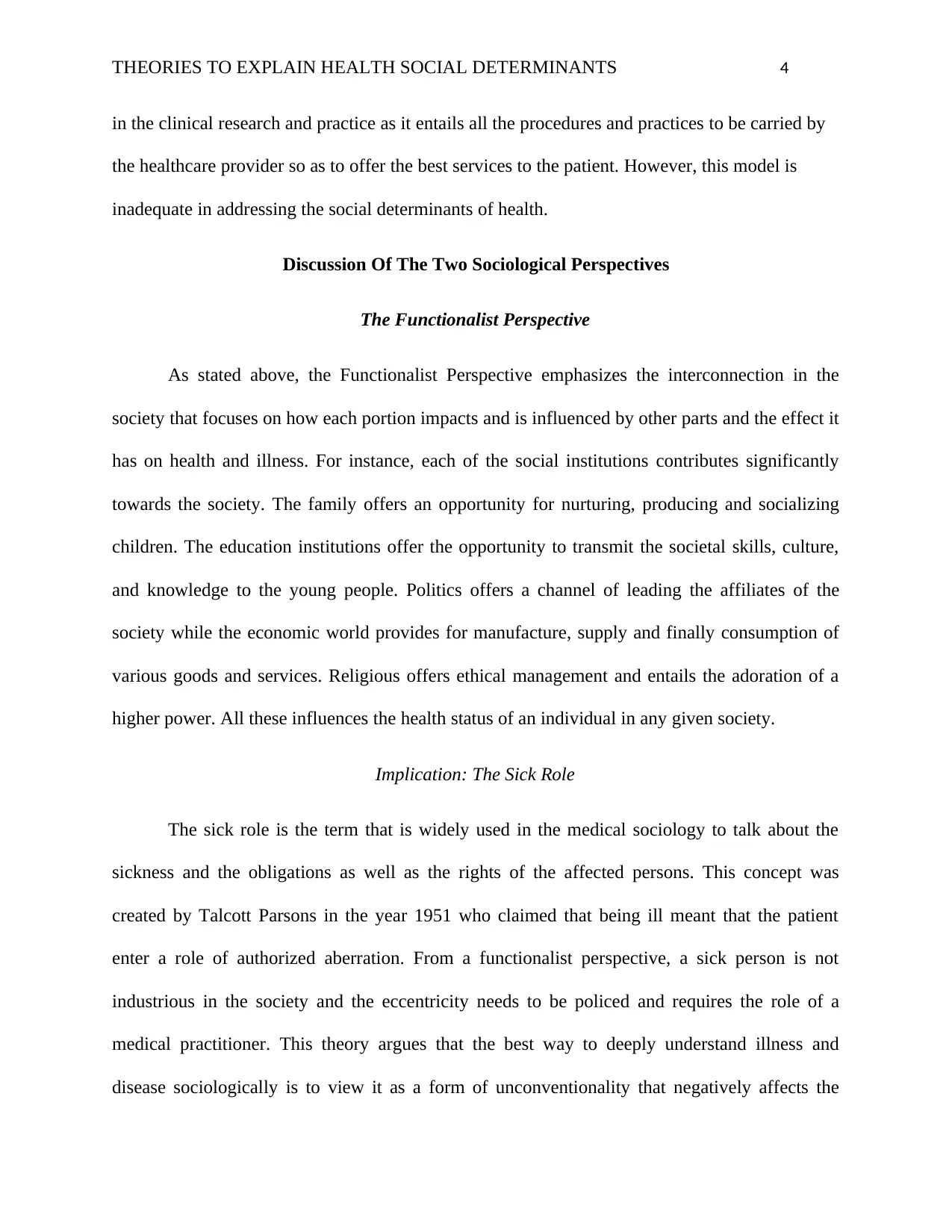
THEORIES TO EXPLAIN HEALTH SOCIAL DETERMINANTS 4
in the clinical research and practice as it entails all the procedures and practices to be carried by
the healthcare provider so as to offer the best services to the patient. However, this model is
inadequate in addressing the social determinants of health.
Discussion Of The Two Sociological Perspectives
The Functionalist Perspective
As stated above, the Functionalist Perspective emphasizes the interconnection in the
society that focuses on how each portion impacts and is influenced by other parts and the effect it
has on health and illness. For instance, each of the social institutions contributes significantly
towards the society. The family offers an opportunity for nurturing, producing and socializing
children. The education institutions offer the opportunity to transmit the societal skills, culture,
and knowledge to the young people. Politics offers a channel of leading the affiliates of the
society while the economic world provides for manufacture, supply and finally consumption of
various goods and services. Religious offers ethical management and entails the adoration of a
higher power. All these influences the health status of an individual in any given society.
Implication: The Sick Role
The sick role is the term that is widely used in the medical sociology to talk about the
sickness and the obligations as well as the rights of the affected persons. This concept was
created by Talcott Parsons in the year 1951 who claimed that being ill meant that the patient
enter a role of authorized aberration. From a functionalist perspective, a sick person is not
industrious in the society and the eccentricity needs to be policed and requires the role of a
medical practitioner. This theory argues that the best way to deeply understand illness and
disease sociologically is to view it as a form of unconventionality that negatively affects the
in the clinical research and practice as it entails all the procedures and practices to be carried by
the healthcare provider so as to offer the best services to the patient. However, this model is
inadequate in addressing the social determinants of health.
Discussion Of The Two Sociological Perspectives
The Functionalist Perspective
As stated above, the Functionalist Perspective emphasizes the interconnection in the
society that focuses on how each portion impacts and is influenced by other parts and the effect it
has on health and illness. For instance, each of the social institutions contributes significantly
towards the society. The family offers an opportunity for nurturing, producing and socializing
children. The education institutions offer the opportunity to transmit the societal skills, culture,
and knowledge to the young people. Politics offers a channel of leading the affiliates of the
society while the economic world provides for manufacture, supply and finally consumption of
various goods and services. Religious offers ethical management and entails the adoration of a
higher power. All these influences the health status of an individual in any given society.
Implication: The Sick Role
The sick role is the term that is widely used in the medical sociology to talk about the
sickness and the obligations as well as the rights of the affected persons. This concept was
created by Talcott Parsons in the year 1951 who claimed that being ill meant that the patient
enter a role of authorized aberration. From a functionalist perspective, a sick person is not
industrious in the society and the eccentricity needs to be policed and requires the role of a
medical practitioner. This theory argues that the best way to deeply understand illness and
disease sociologically is to view it as a form of unconventionality that negatively affects the
Paraphrase This Document
Need a fresh take? Get an instant paraphrase of this document with our AI Paraphraser
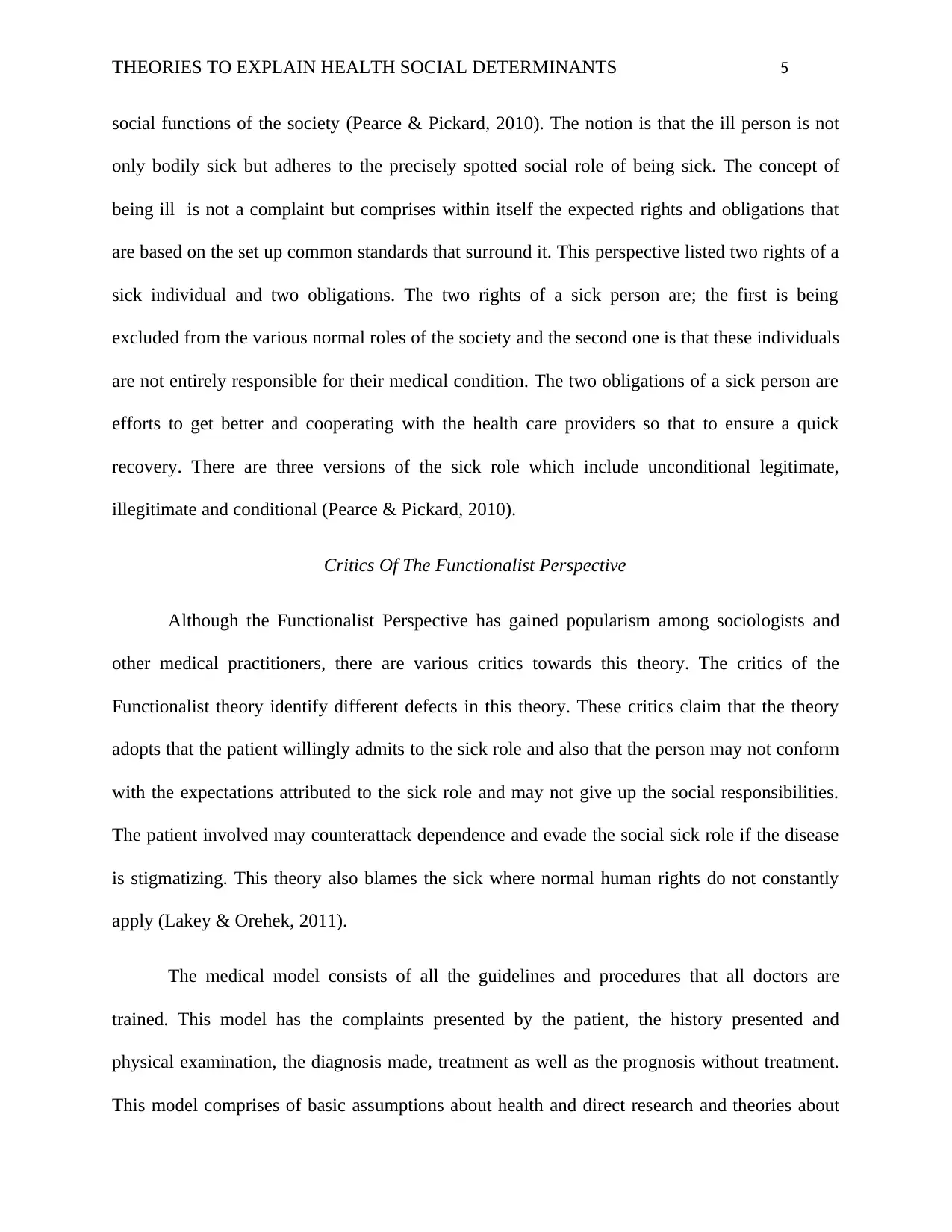
THEORIES TO EXPLAIN HEALTH SOCIAL DETERMINANTS 5
social functions of the society (Pearce & Pickard, 2010). The notion is that the ill person is not
only bodily sick but adheres to the precisely spotted social role of being sick. The concept of
being ill is not a complaint but comprises within itself the expected rights and obligations that
are based on the set up common standards that surround it. This perspective listed two rights of a
sick individual and two obligations. The two rights of a sick person are; the first is being
excluded from the various normal roles of the society and the second one is that these individuals
are not entirely responsible for their medical condition. The two obligations of a sick person are
efforts to get better and cooperating with the health care providers so that to ensure a quick
recovery. There are three versions of the sick role which include unconditional legitimate,
illegitimate and conditional (Pearce & Pickard, 2010).
Critics Of The Functionalist Perspective
Although the Functionalist Perspective has gained popularism among sociologists and
other medical practitioners, there are various critics towards this theory. The critics of the
Functionalist theory identify different defects in this theory. These critics claim that the theory
adopts that the patient willingly admits to the sick role and also that the person may not conform
with the expectations attributed to the sick role and may not give up the social responsibilities.
The patient involved may counterattack dependence and evade the social sick role if the disease
is stigmatizing. This theory also blames the sick where normal human rights do not constantly
apply (Lakey & Orehek, 2011).
The medical model consists of all the guidelines and procedures that all doctors are
trained. This model has the complaints presented by the patient, the history presented and
physical examination, the diagnosis made, treatment as well as the prognosis without treatment.
This model comprises of basic assumptions about health and direct research and theories about
social functions of the society (Pearce & Pickard, 2010). The notion is that the ill person is not
only bodily sick but adheres to the precisely spotted social role of being sick. The concept of
being ill is not a complaint but comprises within itself the expected rights and obligations that
are based on the set up common standards that surround it. This perspective listed two rights of a
sick individual and two obligations. The two rights of a sick person are; the first is being
excluded from the various normal roles of the society and the second one is that these individuals
are not entirely responsible for their medical condition. The two obligations of a sick person are
efforts to get better and cooperating with the health care providers so that to ensure a quick
recovery. There are three versions of the sick role which include unconditional legitimate,
illegitimate and conditional (Pearce & Pickard, 2010).
Critics Of The Functionalist Perspective
Although the Functionalist Perspective has gained popularism among sociologists and
other medical practitioners, there are various critics towards this theory. The critics of the
Functionalist theory identify different defects in this theory. These critics claim that the theory
adopts that the patient willingly admits to the sick role and also that the person may not conform
with the expectations attributed to the sick role and may not give up the social responsibilities.
The patient involved may counterattack dependence and evade the social sick role if the disease
is stigmatizing. This theory also blames the sick where normal human rights do not constantly
apply (Lakey & Orehek, 2011).
The medical model consists of all the guidelines and procedures that all doctors are
trained. This model has the complaints presented by the patient, the history presented and
physical examination, the diagnosis made, treatment as well as the prognosis without treatment.
This model comprises of basic assumptions about health and direct research and theories about
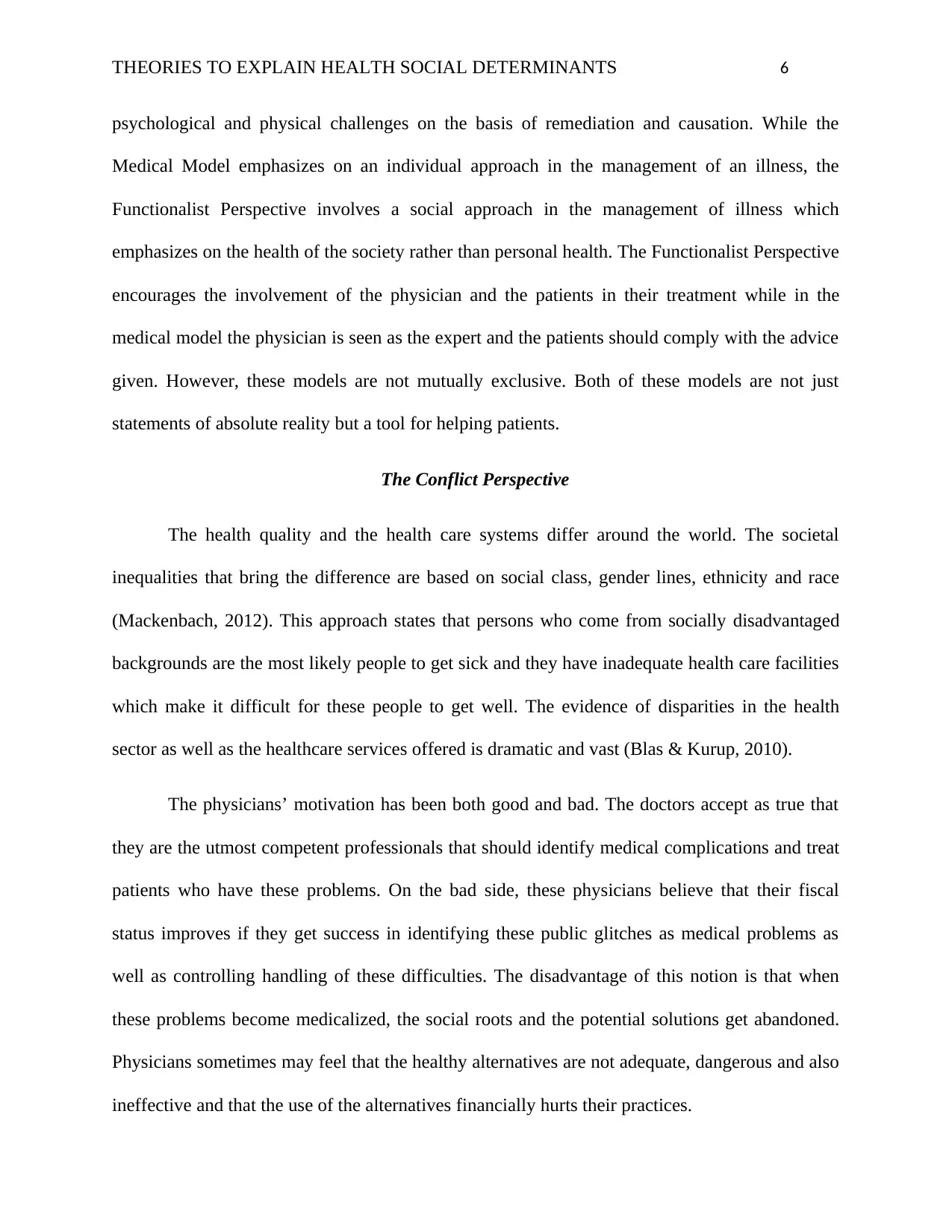
THEORIES TO EXPLAIN HEALTH SOCIAL DETERMINANTS 6
psychological and physical challenges on the basis of remediation and causation. While the
Medical Model emphasizes on an individual approach in the management of an illness, the
Functionalist Perspective involves a social approach in the management of illness which
emphasizes on the health of the society rather than personal health. The Functionalist Perspective
encourages the involvement of the physician and the patients in their treatment while in the
medical model the physician is seen as the expert and the patients should comply with the advice
given. However, these models are not mutually exclusive. Both of these models are not just
statements of absolute reality but a tool for helping patients.
The Conflict Perspective
The health quality and the health care systems differ around the world. The societal
inequalities that bring the difference are based on social class, gender lines, ethnicity and race
(Mackenbach, 2012). This approach states that persons who come from socially disadvantaged
backgrounds are the most likely people to get sick and they have inadequate health care facilities
which make it difficult for these people to get well. The evidence of disparities in the health
sector as well as the healthcare services offered is dramatic and vast (Blas & Kurup, 2010).
The physicians’ motivation has been both good and bad. The doctors accept as true that
they are the utmost competent professionals that should identify medical complications and treat
patients who have these problems. On the bad side, these physicians believe that their fiscal
status improves if they get success in identifying these public glitches as medical problems as
well as controlling handling of these difficulties. The disadvantage of this notion is that when
these problems become medicalized, the social roots and the potential solutions get abandoned.
Physicians sometimes may feel that the healthy alternatives are not adequate, dangerous and also
ineffective and that the use of the alternatives financially hurts their practices.
psychological and physical challenges on the basis of remediation and causation. While the
Medical Model emphasizes on an individual approach in the management of an illness, the
Functionalist Perspective involves a social approach in the management of illness which
emphasizes on the health of the society rather than personal health. The Functionalist Perspective
encourages the involvement of the physician and the patients in their treatment while in the
medical model the physician is seen as the expert and the patients should comply with the advice
given. However, these models are not mutually exclusive. Both of these models are not just
statements of absolute reality but a tool for helping patients.
The Conflict Perspective
The health quality and the health care systems differ around the world. The societal
inequalities that bring the difference are based on social class, gender lines, ethnicity and race
(Mackenbach, 2012). This approach states that persons who come from socially disadvantaged
backgrounds are the most likely people to get sick and they have inadequate health care facilities
which make it difficult for these people to get well. The evidence of disparities in the health
sector as well as the healthcare services offered is dramatic and vast (Blas & Kurup, 2010).
The physicians’ motivation has been both good and bad. The doctors accept as true that
they are the utmost competent professionals that should identify medical complications and treat
patients who have these problems. On the bad side, these physicians believe that their fiscal
status improves if they get success in identifying these public glitches as medical problems as
well as controlling handling of these difficulties. The disadvantage of this notion is that when
these problems become medicalized, the social roots and the potential solutions get abandoned.
Physicians sometimes may feel that the healthy alternatives are not adequate, dangerous and also
ineffective and that the use of the alternatives financially hurts their practices.
⊘ This is a preview!⊘
Do you want full access?
Subscribe today to unlock all pages.

Trusted by 1+ million students worldwide
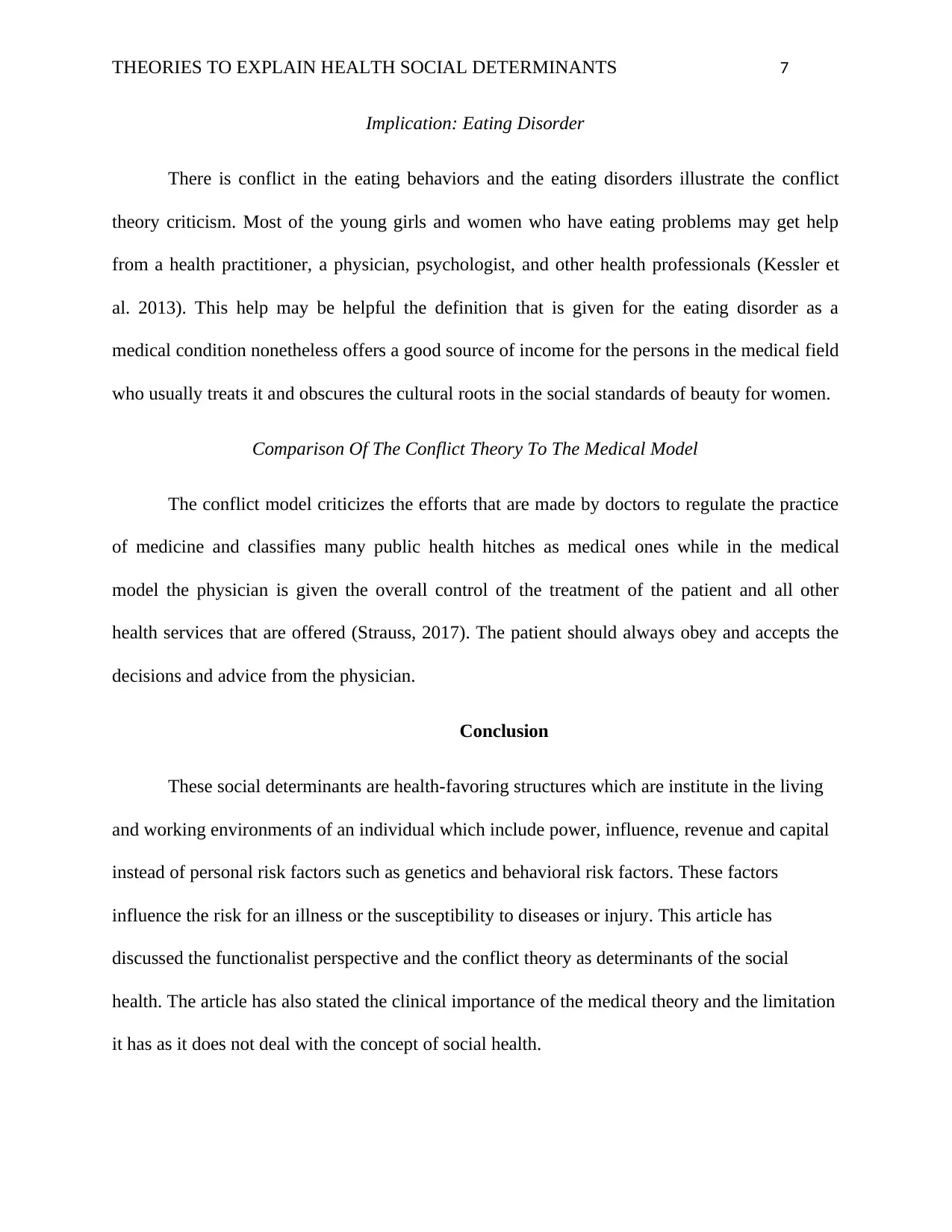
THEORIES TO EXPLAIN HEALTH SOCIAL DETERMINANTS 7
Implication: Eating Disorder
There is conflict in the eating behaviors and the eating disorders illustrate the conflict
theory criticism. Most of the young girls and women who have eating problems may get help
from a health practitioner, a physician, psychologist, and other health professionals (Kessler et
al. 2013). This help may be helpful the definition that is given for the eating disorder as a
medical condition nonetheless offers a good source of income for the persons in the medical field
who usually treats it and obscures the cultural roots in the social standards of beauty for women.
Comparison Of The Conflict Theory To The Medical Model
The conflict model criticizes the efforts that are made by doctors to regulate the practice
of medicine and classifies many public health hitches as medical ones while in the medical
model the physician is given the overall control of the treatment of the patient and all other
health services that are offered (Strauss, 2017). The patient should always obey and accepts the
decisions and advice from the physician.
Conclusion
These social determinants are health-favoring structures which are institute in the living
and working environments of an individual which include power, influence, revenue and capital
instead of personal risk factors such as genetics and behavioral risk factors. These factors
influence the risk for an illness or the susceptibility to diseases or injury. This article has
discussed the functionalist perspective and the conflict theory as determinants of the social
health. The article has also stated the clinical importance of the medical theory and the limitation
it has as it does not deal with the concept of social health.
Implication: Eating Disorder
There is conflict in the eating behaviors and the eating disorders illustrate the conflict
theory criticism. Most of the young girls and women who have eating problems may get help
from a health practitioner, a physician, psychologist, and other health professionals (Kessler et
al. 2013). This help may be helpful the definition that is given for the eating disorder as a
medical condition nonetheless offers a good source of income for the persons in the medical field
who usually treats it and obscures the cultural roots in the social standards of beauty for women.
Comparison Of The Conflict Theory To The Medical Model
The conflict model criticizes the efforts that are made by doctors to regulate the practice
of medicine and classifies many public health hitches as medical ones while in the medical
model the physician is given the overall control of the treatment of the patient and all other
health services that are offered (Strauss, 2017). The patient should always obey and accepts the
decisions and advice from the physician.
Conclusion
These social determinants are health-favoring structures which are institute in the living
and working environments of an individual which include power, influence, revenue and capital
instead of personal risk factors such as genetics and behavioral risk factors. These factors
influence the risk for an illness or the susceptibility to diseases or injury. This article has
discussed the functionalist perspective and the conflict theory as determinants of the social
health. The article has also stated the clinical importance of the medical theory and the limitation
it has as it does not deal with the concept of social health.
Paraphrase This Document
Need a fresh take? Get an instant paraphrase of this document with our AI Paraphraser
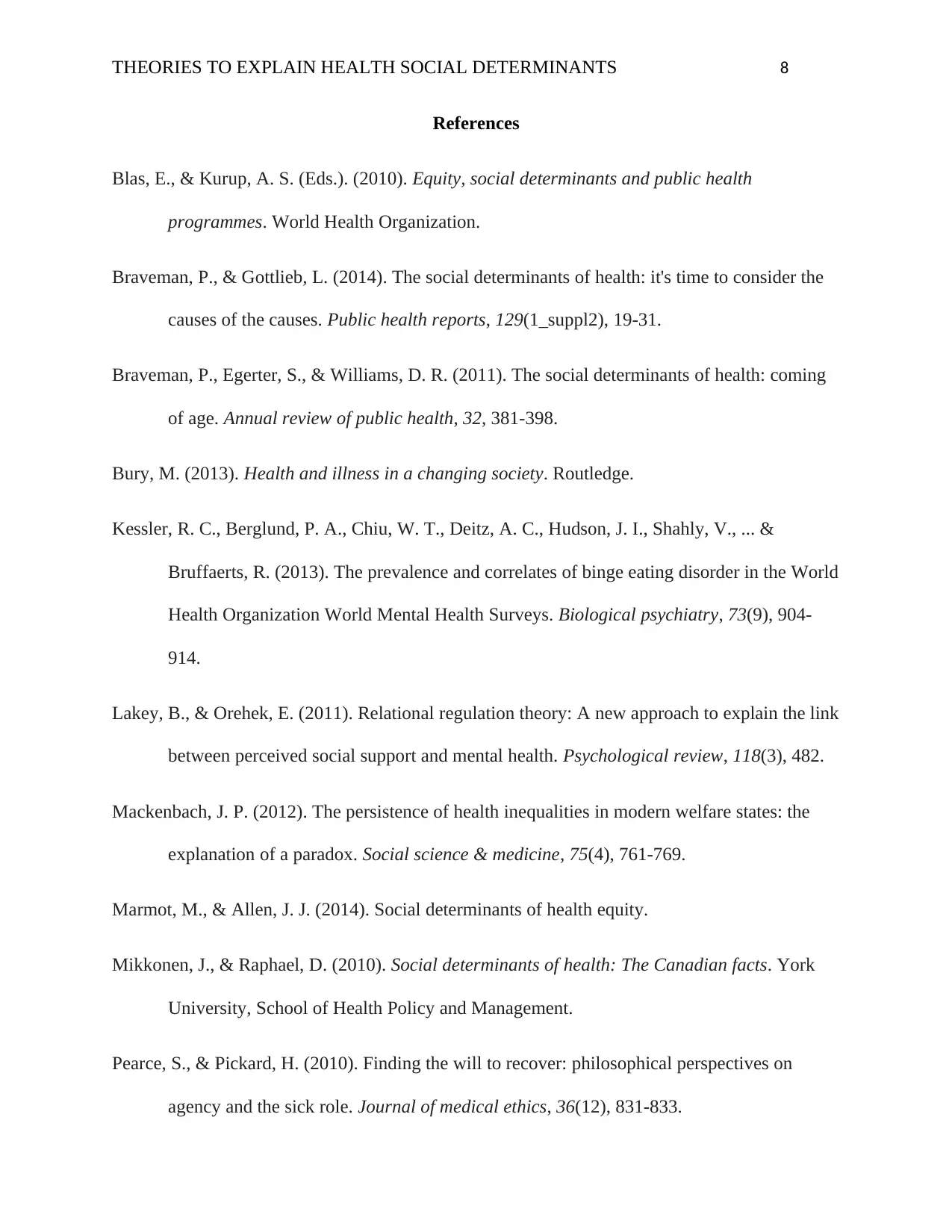
THEORIES TO EXPLAIN HEALTH SOCIAL DETERMINANTS 8
References
Blas, E., & Kurup, A. S. (Eds.). (2010). Equity, social determinants and public health
programmes. World Health Organization.
Braveman, P., & Gottlieb, L. (2014). The social determinants of health: it's time to consider the
causes of the causes. Public health reports, 129(1_suppl2), 19-31.
Braveman, P., Egerter, S., & Williams, D. R. (2011). The social determinants of health: coming
of age. Annual review of public health, 32, 381-398.
Bury, M. (2013). Health and illness in a changing society. Routledge.
Kessler, R. C., Berglund, P. A., Chiu, W. T., Deitz, A. C., Hudson, J. I., Shahly, V., ... &
Bruffaerts, R. (2013). The prevalence and correlates of binge eating disorder in the World
Health Organization World Mental Health Surveys. Biological psychiatry, 73(9), 904-
914.
Lakey, B., & Orehek, E. (2011). Relational regulation theory: A new approach to explain the link
between perceived social support and mental health. Psychological review, 118(3), 482.
Mackenbach, J. P. (2012). The persistence of health inequalities in modern welfare states: the
explanation of a paradox. Social science & medicine, 75(4), 761-769.
Marmot, M., & Allen, J. J. (2014). Social determinants of health equity.
Mikkonen, J., & Raphael, D. (2010). Social determinants of health: The Canadian facts. York
University, School of Health Policy and Management.
Pearce, S., & Pickard, H. (2010). Finding the will to recover: philosophical perspectives on
agency and the sick role. Journal of medical ethics, 36(12), 831-833.
References
Blas, E., & Kurup, A. S. (Eds.). (2010). Equity, social determinants and public health
programmes. World Health Organization.
Braveman, P., & Gottlieb, L. (2014). The social determinants of health: it's time to consider the
causes of the causes. Public health reports, 129(1_suppl2), 19-31.
Braveman, P., Egerter, S., & Williams, D. R. (2011). The social determinants of health: coming
of age. Annual review of public health, 32, 381-398.
Bury, M. (2013). Health and illness in a changing society. Routledge.
Kessler, R. C., Berglund, P. A., Chiu, W. T., Deitz, A. C., Hudson, J. I., Shahly, V., ... &
Bruffaerts, R. (2013). The prevalence and correlates of binge eating disorder in the World
Health Organization World Mental Health Surveys. Biological psychiatry, 73(9), 904-
914.
Lakey, B., & Orehek, E. (2011). Relational regulation theory: A new approach to explain the link
between perceived social support and mental health. Psychological review, 118(3), 482.
Mackenbach, J. P. (2012). The persistence of health inequalities in modern welfare states: the
explanation of a paradox. Social science & medicine, 75(4), 761-769.
Marmot, M., & Allen, J. J. (2014). Social determinants of health equity.
Mikkonen, J., & Raphael, D. (2010). Social determinants of health: The Canadian facts. York
University, School of Health Policy and Management.
Pearce, S., & Pickard, H. (2010). Finding the will to recover: philosophical perspectives on
agency and the sick role. Journal of medical ethics, 36(12), 831-833.
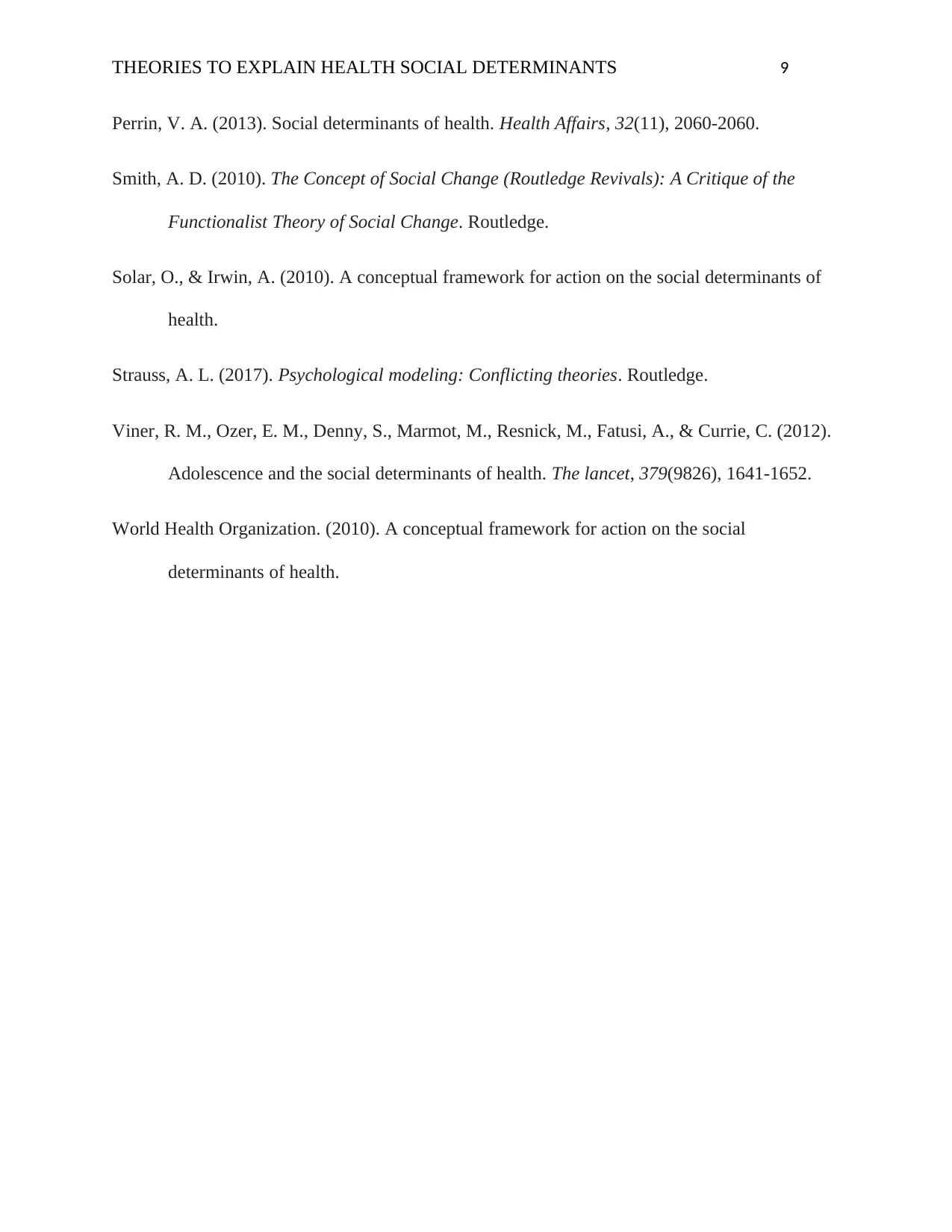
THEORIES TO EXPLAIN HEALTH SOCIAL DETERMINANTS 9
Perrin, V. A. (2013). Social determinants of health. Health Affairs, 32(11), 2060-2060.
Smith, A. D. (2010). The Concept of Social Change (Routledge Revivals): A Critique of the
Functionalist Theory of Social Change. Routledge.
Solar, O., & Irwin, A. (2010). A conceptual framework for action on the social determinants of
health.
Strauss, A. L. (2017). Psychological modeling: Conflicting theories. Routledge.
Viner, R. M., Ozer, E. M., Denny, S., Marmot, M., Resnick, M., Fatusi, A., & Currie, C. (2012).
Adolescence and the social determinants of health. The lancet, 379(9826), 1641-1652.
World Health Organization. (2010). A conceptual framework for action on the social
determinants of health.
Perrin, V. A. (2013). Social determinants of health. Health Affairs, 32(11), 2060-2060.
Smith, A. D. (2010). The Concept of Social Change (Routledge Revivals): A Critique of the
Functionalist Theory of Social Change. Routledge.
Solar, O., & Irwin, A. (2010). A conceptual framework for action on the social determinants of
health.
Strauss, A. L. (2017). Psychological modeling: Conflicting theories. Routledge.
Viner, R. M., Ozer, E. M., Denny, S., Marmot, M., Resnick, M., Fatusi, A., & Currie, C. (2012).
Adolescence and the social determinants of health. The lancet, 379(9826), 1641-1652.
World Health Organization. (2010). A conceptual framework for action on the social
determinants of health.
⊘ This is a preview!⊘
Do you want full access?
Subscribe today to unlock all pages.

Trusted by 1+ million students worldwide
1 out of 9
Related Documents
Your All-in-One AI-Powered Toolkit for Academic Success.
+13062052269
info@desklib.com
Available 24*7 on WhatsApp / Email
![[object Object]](/_next/static/media/star-bottom.7253800d.svg)
Unlock your academic potential
Copyright © 2020–2026 A2Z Services. All Rights Reserved. Developed and managed by ZUCOL.





